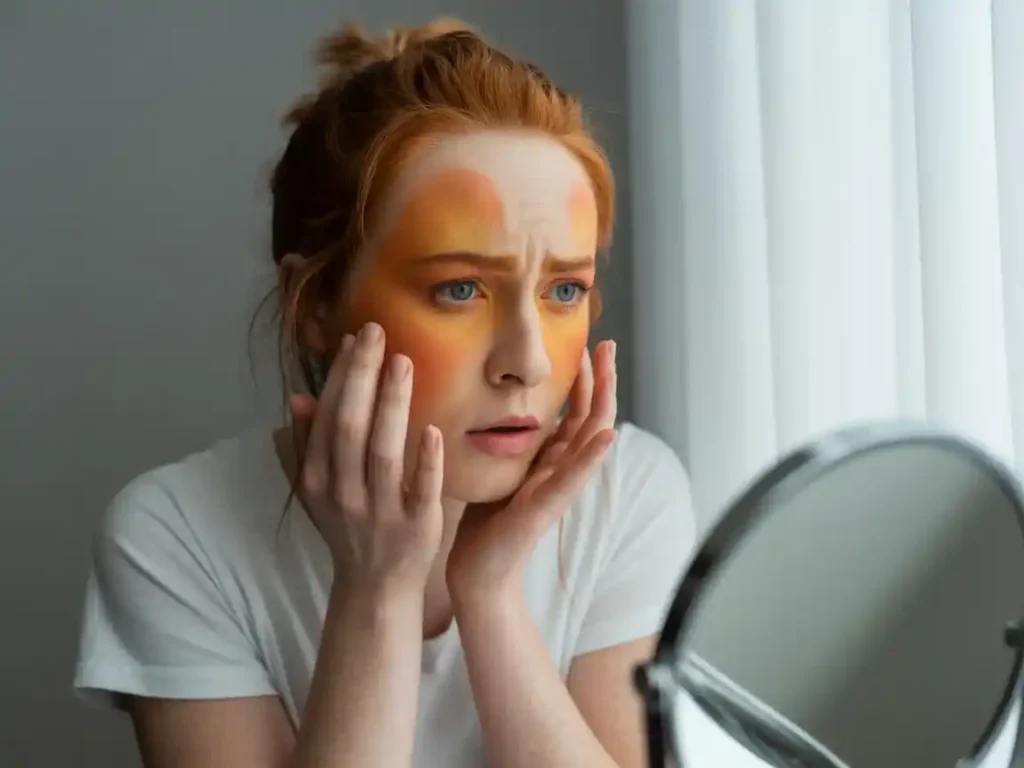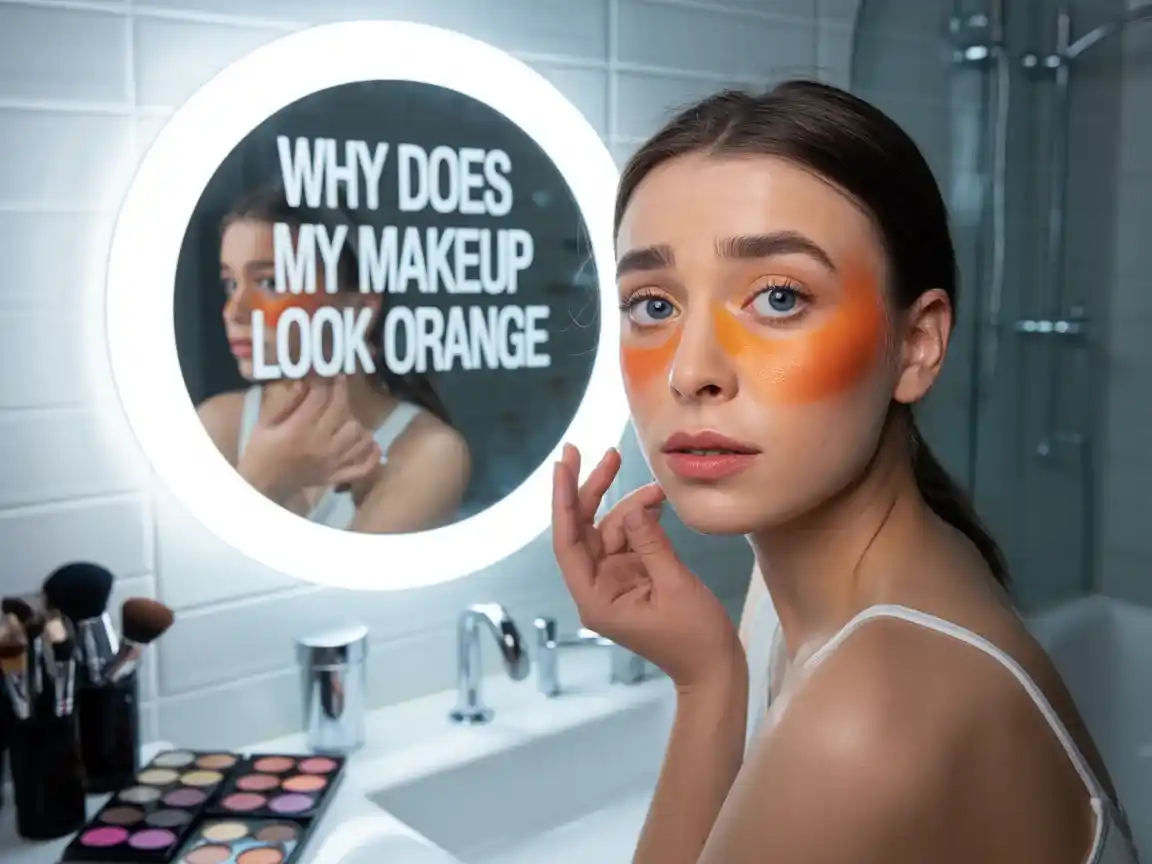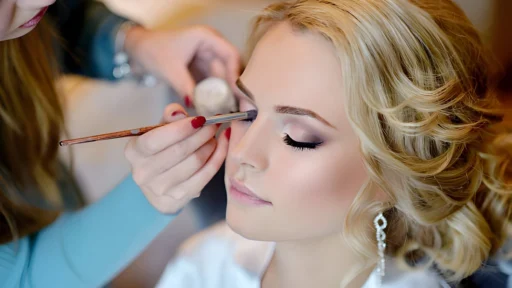Your makeup may look orange for two reasons. First, your foundation may have the wrong undertone. Second, it could oxidize after application. Always test shades in natural light, match them to your neck, and use a primer to help control oxidation and achieve a better skin match.
Here are expert tips to help your makeup look fresh, natural, and perfectly matched every time.
Common Reasons Your Makeup Looks Orange:

Makeup turns orange when foundation mismatches your undertone or oxidizes from skin oils. Poor shade matching and skin oils also cause color changes after application.
- Wrong Foundation Shade:
Applying a foundation that clashes with your skin tone or undertone can result in an uneven, overly dark, or orange appearance after it sets. - Oxidation of Foundation:
Foundation oxidation happens when makeup reacts with air and skin oils, causing the color to darken or turn orange after application. - Incorrect Lighting During Application:
Applying makeup in poor or artificial lighting can mislead color perception, causing the foundation to appear orange or mismatched in natural daylight. - Skin Type and Condition:
Your makeup may look orange if your foundation does not match your skin type and condition. Oiliness, dryness, or wrong undertones can affect how the product reacts and appears. - Expired or Poor Quality Products:
Expired or low-quality makeup may trigger breakouts, irritation, or even skin infections. Their ingredients may break down over time, making them unsafe and less effective for your skin.
Understanding Makeup Shades and Undertones:
Understanding makeup shades and undertones helps prevent orange tones from appearing. A foundation with the wrong undertone always looks unnatural. Always test shades in natural light before buying. To find your perfect match, always swatch and check the shade in natural lighting before purchasing.
What are Undertones?
Undertones are the subtle colors beneath your skin’s surface, warm, cool, or neutral, that affect how makeup shades appear. Knowing your undertone ensures a natural, flawless makeup match every time.
How Undertones Affect Foundation Colour?
Undertones guide how the foundation looks on your skin. Using the wrong undertone can lead to orange tones or an uneven, unnatural finish. Correct undertones ensure a seamless, natural finish suited to your skin tone.
How to Choose the Right Foundation Shade?
Test foundation shades in natural light on your jawline. Match the shade with your skin’s undertone and type for a flawless, natural look that suits your unique complexion.
- Identifying Your Skin Undertone:
Look at the veins on your wrist. Blue or purple suggests a cool undertone; green indicates a warm undertone and a mix points to neutral. Knowing your undertone helps you pick the right makeup and skincare products. - Testing Foundation Before Buying:
Apply foundation on your jawline in daylight. Observe if it blends smoothly and matches your skin’s undertone and texture to avoid mistakes and get a natural look.
Preventing Foundation Oxidation:
Prevent oxidation by using a foundation tailored to your skin type, applying a primer, and finishing with powder. Avoid mixing products that cause color changes after application.
What Causes Oxidation?
Oxidation happens when makeup reacts with air, skin oils, or moisture, causing it to darken or change color. Ingredients like iron oxides and your skin’s pH can trigger this natural reaction.
Tips to Avoid Oxidation:
- Use a primer: It creates a barrier between your skin and foundation.
- Choose oil-free formulas: Excess oil speeds up oxidation.
- Test in natural light: This ensures the best foundation match.
- Set with powder: It controls shine and locks your base in place.
- Prep your skin: Clean, moisturized skin helps makeup stay true.
Makeup Application Tips to Avoid the Orange Look:
- Proper Base Preparation:Cleanse your face, apply lightweight moisturizer, and use primer. This smooths the skin, helps makeup stick better, and prevents caking or oxidation.
- Using the Right Tools:
Select high-quality brushes and sponges for a smooth, even makeup application. Proper tools enhance blending, reduce streaks, and help your look last longer and appear natural.
The Role of Skin Care in Makeup Colour:
Healthy, well-moisturized skin creates a smooth base, ensuring makeup applies evenly and colours appear true, preventing patchiness or uneven oxidation throughout the day.
- Hydration and Its Effects:
Hydrated skin stays smooth and healthy, allowing makeup to apply evenly, look fresh longer, and prevent dryness or flaky patches throughout the day. - Exfoliation and Smooth Base:
Regular exfoliation removes dead skin cells, creating a smooth surface that helps makeup apply evenly and last longer without patchiness or uneven texture.
What to Do If Your Makeup Turns Orange?
Blot excess oil, apply translucent powder, and switch to a foundation with the correct undertone. Always try foundation shades in natural daylight before purchasing.
- Quick Fixes:
Blot oily areas, apply a light layer of translucent powder or mix a bit of moisturizer into your foundation to instantly refresh and balance the look. - When to Replace Your Products:
To prevent eye infections, replace mascara every 3 months. Foundation and lipstick can remain usable for 12–18 months when stored correctly.
Conclusion:
Avoid the orange makeup look by selecting the right foundation, identifying your undertone, and preparing your skin properly. Simple steps lead to flawless, natural results every time.
FAQ’s:
Q1. Why does my foundation turn orange a few hours after application?
The foundation can turn orange due to oxidation, skin oils, or using a shade with the wrong undertone.
Q2. How can I tell if my foundation undertone is wrong for my skin?
If your foundation looks dull, orange, or unnatural, it’s likely the undertone does not match your skin properly.
Q3. Can skin type affect how foundation oxidizes?
Yes, oily or combination skin can accelerate oxidation, causing the foundation to appear darker or more orange over time.
Q4. What role does skincare play in preventing orange makeup?
Proper skincare helps balance your skin, ensures the foundation applies evenly, and prevents oxidation that can cause an orange tint.
Q5. How to stop makeup from looking orange?
Use a foundation that matches your undertone, apply on prepped skin, and avoid formulas prone to oxidation.
Also read:





